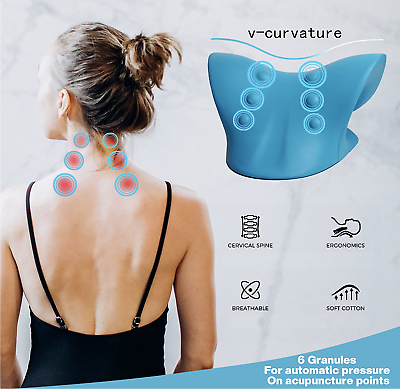Boost Your Stance and Lower Neck Discomfort with the Neck Cloud
Boost Your Stance and Lower Neck Discomfort with the Neck Cloud
Blog Article
The Influence of Anxiety on Neck Pain: Techniques for Reducing Tension and Pain
In today's fast-paced globe, it's obvious that tension has actually become a widespread factor in the beginning and worsening of neck pain. The complex partnership in between anxiety and muscular tissue tension typically leaves people seeking remedy for the pain that follows. By exploring targeted techniques targeted at reducing tension and promoting leisure, one can start to address the origin of neck discomfort and work towards a much more well balanced state of wellness. Join us on a journey to unravel the impact of anxiety on neck pain and uncover effective ways to alleviate discomfort and enhance general lifestyle.
Recognizing Stress-Related Neck Discomfort
Stress-related neck discomfort can materialize as tension, rigidity, or discomfort in the neck and shoulder area. The link between anxiety and neck pain lies in the body's physical reaction to stress, which can result in muscular tissue tension and rigidity in the neck muscle mass.

Identifying Common Stress Areas
Often experienced by people under tension, stress locations in the body can offer beneficial insights into the physical indications of psychological stress. One common tension location is the neck, where tension commonly shows up literally. Tension migraines, rigid neck muscle mass, and limited variety of motion are usual signs and symptoms of stress-related neck tension. The shoulders are one more usual area where tension builds up. Anxiety can create the muscles in the shoulders to tighten, causing pain and discomfort. In addition, the upper back is prone to tension build-up, particularly in people that experience persistent stress. Poor position and extended resting can worsen stress in this location. The jaw is additionally an usual location for stress-related tension, as numerous people clinch their jaw or grind their teeth when worried. Recognizing these usual stress locations can aid people identify the physical indicators of stress and anxiety and take actions to address them before they escalate right into persistent discomfort or pain.
Executing Relaxation Strategies
To properly handle stress-related tension in the body, implementing leisure methods is important. Relaxation strategies are important tools for minimizing neck pain brought on by stress. Deep breathing workouts can aid soothe the mind and weblink relax stressful muscle mass in the neck and shoulders (neck cloud). Practicing mindfulness reflection can likewise be useful in reducing stress and advertising relaxation. Modern muscle leisure, where you systematically stressful and after that kick back various muscle mass teams, can release built-up stress in the neck area. Furthermore, activities like yoga and tai chi include both physical movement and leisure, making them efficient techniques for decreasing stress and anxiety and neck pain. Taking normal breaks throughout the day to stretch and relax can protect against muscle rigidity and stress from collecting. By including these relaxation strategies into your everyday regimen, you can help handle stress and anxiety levels, minimize stress in the neck, and reduce pain linked with stress-induced neck pain.
Integrating Self-Care Practices
Integrating self-care methods is essential for maintaining overall well-being and managing stress-related neck pain effectively. Engaging in regular exercise, such as gentle stretching workouts or yoga exercise, can assist relieve stress in the neck and shoulders. Practicing good position throughout have a peek at this site the day and taking frequent breaks from prolonged sitting or display time can additionally protect against pressure on the neck muscular tissues.
In addition, focusing on appropriate sleep and establishing a constant rest regimen can add dramatically to lowering stress and anxiety degrees and promoting relaxation. Developing a relaxing going to bed routine, such as reading a publication or taking a cozy bath, can help prepare the mind and body for peaceful sleep. Additionally, keeping a balanced diet regimen abundant in nutrients and staying hydrated can sustain general health and reduce swelling that may exacerbate neck discomfort.
Integrating mindfulness practices, such as deep breathing workouts or meditation, can aid handle stress and advertise relaxation. Taking time for oneself, participating in pastimes, and establishing limits to protect individual time are also essential aspects of self-care that can add to decreasing stress and anxiety and relieving neck pain.
Looking For Expert Aid
Exactly how can people efficiently resolve consistent neck discomfort that is impacting their daily life and well-being? Looking for specialist help can be a crucial action in handling and minimizing neck discomfort. Consulting with healthcare experts such as chiropractic practitioners, physical specialists, or orthopedic professionals can supply beneficial understandings and customized treatment plans. These specialists can conduct thorough analyses to detect the underlying sources of neck discomfort and suggest appropriate interventions.
Chiropractic practitioners specialize in back manipulation techniques to enhance placement and lower tension in the neck location. Physical therapists supply targeted stretches and exercises to reinforce muscles, improve flexibility, and improve total neck function. Orthopedic experts can supply innovative clinical interventions such as shots or surgical choices for severe instances of neck pain.
Final Thought

Stress-related neck pain can materialize as stress, tightness, or discomfort in the neck and shoulder area. The connection between anxiety and neck pain exists in the body's physical action to anxiety, which can result in muscle mass stress and tightness in the neck muscle mass. Tension headaches, rigid neck muscular tissues, and restricted array of motion are usual signs and symptoms of stress-related neck tension. By integrating these relaxation methods into your everyday regimen, you can assist manage stress degrees, lower stress in the neck, and ease pain associated with stress-induced neck pain.

Report this page